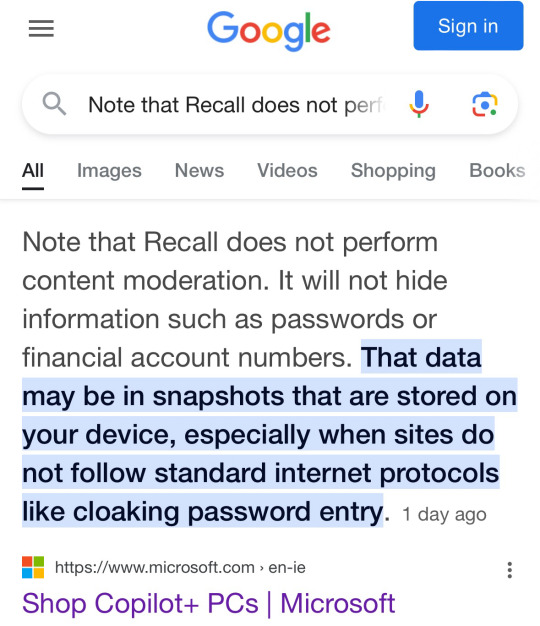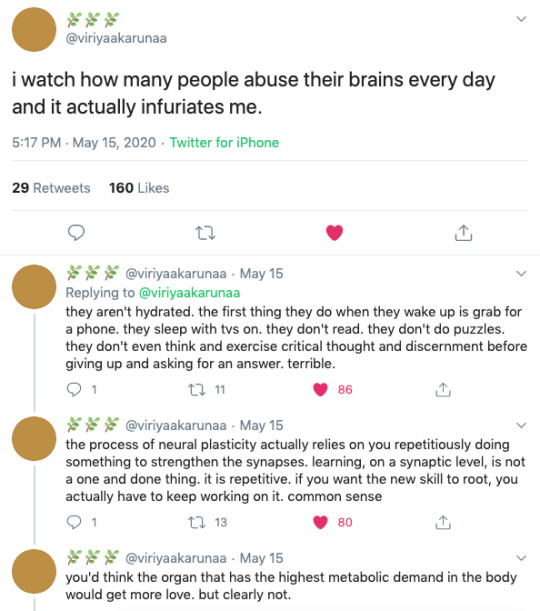Creative writer, amateur photographer and filmmaker, lover of quotes, books, people watching, natural hair, running,and so much more. Life is rough but trying to make the best of it.
Don't wanna be here? Send us removal request.
Text
#information #facts #windows computer #spyware
Literal definition of spyware:

Also From Microsoft’s own FAQ: "Note that Recall does not perform content moderation. It will not hide information such as passwords or financial account numbers. 🤡

233K notes
·
View notes
Text
#thenewjimcrow #book #information #education
I am pleading once again for white liberals to read The New Jim Crow and see how racist policing and law enforcement is 1) bipartisan and 2) the key to how people of color (Black people specifically) are systemically, violently, and purposely kept in check in this country. Begging y'all to see that someone doesn't have to say a slur to be antiblack in the entirety of their belief system, that the status quo you live under is maintained by the suffering (both current and potential) of millions
21K notes
·
View notes
Text
#informative #critical thinking #information
if I've learned anything from grad school it's to check your sources, and this has proven invaluable in the dozens of instances when I've had an MBA-type try to tell me something about finances or leadership. Case in point:

Firefox serves me clickbaity articles through Pocket, which is fine because I like Firefox. But sometimes an article makes me curious. I'm pretty anal about my finances, and I wondered if this article was, as I suspected, total horseshit, or could potentially benefit me and help me get my spending under control. So let's check the article in question.
It mostly seems like common sense. "...track expenses and income for at least a month before setting a budget...How much money do I have or earn? How much do I want to save?" Basic shit like that. But then I get to this section:

This sounds fucking made up to me. And thankfully, they've provided a source to their claim that "research has repeatedly shown" that writing things down changes behavior. First mistake. What research is this?

Forbes, naturally, my #1 source for absolute dogshit fart-sniffing financial schlock. Forbes is the type of website that guy from high school who constantly posts on linkedin trawls daily for little articles like this that make him feel better about refusing to pay for a decent package for his employees' healthcare (I'm from the United States, a barbaric, conflict-ridden country in the throes of civil unrest, so obsessed with violence that its warlords prioritize weapons over universal medical coverage. I digress). Forbes constantly posts shit like this, and I constantly spend my time at leadership seminars debunking poor consultants who get paid to read these claims credulously. Look at this highlighted text. Does it make sense to you that simply writing your financial goals down would result in a 10x increase in your income? Because if it does, let me make you an offer on this sick ass bridge.
Thankfully, Forbes also makes the mistake of citing their sources. Let's check to see where this hyperlink goes:

SidSavara. I've never heard of this site, but the About section tells me that Sid is "a technology leader who empowers teams to grow into their best selves. He is a life-long learner enjoys developing software, leading teams in delivering mission critical projects, playing guitar and watching football and basketball."
That doesn't mean anything. What are his LinkedIn credentials? With the caveat that anyone can lie on Linkedin, Mr. Savara appears to be a Software Engineer. Which is fine! I'm glad software engineers exist! But Sid's got nothing in his professional history which suggests he knows shit about finance. So I'm already pretty skeptical of his website, which is increasingly looking like a personal fart-huffing blog.
The article itself repeats the credulous claim made in the Forbes story earlier, but this time, provides no link for the 3% story. Mr. Savara is smarter than his colleages at Forbes, it's much wiser to just make shit up.
HOWEVER. I am not the first person to have followed this rabbit hole. Because at the very top of this article, there is a disclaimer.

Uh oh!
Sid's been called out before, and in the follow up to this article, he reveals the truth.

You can guess where this is going.


So to go back to the VERY beginning of this post, both Pocket/Good Housekeeping and Forbes failed to do even the most basic of research, taking the wild claim that writing down your budget may increase your income by 10x on good faith and the word of a(n admittedly honest about his shortcomings) software engineer.
Why did I spend 30 minutes to make a tumblr post about this? Mostly to show off how smart I am, but also to remind folks of just how flimsy any claim on the internet can be. Click those links, follow those sources, and when the sources stop linking, ask why.
20K notes
·
View notes
Text
#quotes #brooke Hampton #self love
“One of these days you’re going to wake up and realize you’re beautiful and powerful … That will be the day you stop running after people who don’t see your worth. That will be a really good day.”
— Brooke Hampton
110 notes
·
View notes
Text
#quotes #georgia o’ keeffe #self love

— Georgia O'Keeffe
47K notes
·
View notes
Text
#information #facts #democratic republic of the Congo


A three-decade-long war on Congolese civilians summarized in this infographic illustration by Lizar_tistry on Instagram.
661 notes
·
View notes
Text
#information #facts #democratic republic of the Congo #on #boycotting
"the cost of convenience does not have to be human lives. we are literally conditioned to think that in order for us to have certain things someone has to suffer and that is the farthest thing from the truth."
3K notes
·
View notes
Text
#op-ed #homelessness #article
By Thom Hartmann
Back in 1967, a friend of mine and I hitchhiked from East Lansing, Michigan to San Francisco to spend the summer in Haight-Ashbury. One ride dropped us off in Sparks, Nevada, and within minutes of putting our thumbs out a city police car stopped and arrested us for vagrancy.
The cop, a young guy with an oversized mustache who was apologetic for the city’s policy, drove us to the desert a mile or so beyond the edge of town, where we hitchhiked standing by a distressing light-post covered with graffiti reading “39 hours without a ride,” “going on our third day,” and “anybody got any water?”
Vagrancy laws were so 20th century.
Today, the US Supreme Court heard a case involving efforts by the City of Grants Pass, Oregon to keep homeless people off its streets and out of its parks and other public property. The city had tried a number of things when the problem began to explode in the last year of the Trump administration, as The Oregonian newspaper notes:
“They discussed putting them in their old jail, creating an unwanted list, posting signs at the city border or driving people out of town... Currently, officers patrol the city nearly every day, Johnson said, handing out [$295] citations to people who are camping or sleeping on public property or for having too many belongings with them.”
The explosion in housing costs has triggered two crises: homelessness and inflation. The former is harming the livability of our cities and towns, and the Fed’s reaction to the latter threatens an incumbency-destroying recession just as we head into what will almost certainly be the most important election in American history.
The problem with housing inflation is so severe today that without it the nation’s overall core CPI inflation rate would be in the neighborhood of Fed Chairman Jerome Powell’s 2% goal.

Graphic based on BLM data and interpretation by The Financial Times
Both homelessness and today’s inflation are the result of America — unlike many other countries — allowing housing to become a commodity that can be traded and speculated in by financial markets and overseas investors.
Forty-three years into America’s Reaganomics experiment, homelessness has gone from a problem to a crisis. Rarely, though, do you hear that Wall Street — a prime beneficiary of Reagan’s deregulation campaign — is helping cause it.
32% seems to be the magic threshold, according to research funded by the real estate listing company Zillow. When neighborhoods hit rent rates in excess of 32% of neighborhood income, homelessness explodes.
And we’re seeing it play out right in front of us in cities across America because a handful of Wall Street billionaires want to make a killing.
It wasn’t always this way in America.
Housing prices have spun out of control since my dad bought his house in 1957 when I was six years old. He got a Veteran’s Administration-subsidized loan and picked up the brand-new 3-bedroom-1-bath ranch house my 3 brothers and I grew up in, in suburban south Lansing, Michigan. It cost him $13,000, which was about twice what he made every year working a good union job in a tool-and-die shop.
When my dad bought his home in the 1950s the median price of a single-family house was 2.2 times the median American family income. Today, the Fed says, the median house sells for $479,500 while the median American personal income is $41,000 — a ratio of more than ten-to-one between housing costs and annual income.
As the Zillow study notes:
“Across the country, the rent burden already exceeds the 32% [of median income] threshold in 100 of the 386 markets included in this analysis….”
And wherever housing prices become more than three times annual income, homelessness stalks like the grim reaper.
We’re told that America’s cities have seen this increase in housing costs since the 1950s in some part because of the growing wealth and population of this country. There were, after all, 168 million people in the US the year my dad bought his house; today there are 330 million.
And it’s true that we haven’t been building enough new housing, particularly low-income housing, as 43 years of neoliberal Reaganomics have driven down wages and income for working-class people relative to all of their expenses while stopping the construction of virtually any new subsidized low-income housing.
But that’s not the only, or even the main dynamic, driving housing prices into the stratosphere — and, as a consequence, the crisis in homelessness — over the past decade. You can thank speculation for much of that.
As the Zillow-funded study noted:
“This research demonstrates that the homeless population climbs faster when rent affordability — the share of income people spend on rent — crosses certain thresholds. In many areas beyond those thresholds, even modest rent increases can push thousands more Americans into homelessness.”
So how did we get here?
It started with a wave of foreign buyers over the past 30 years (particularly from China, Canada, Mexico, India and Colombia) who, in just the one single year of 2020, picked up over 154,000 homes as their way of parking money in America. Which is part of why there are over 20 times more empty houses in America than there are homeless people.
As Marketwatch noted in a 2015 article titled “The Danger of Foreign Buyers Gobbling Up American Homes”:
“Unusual high appreciation of the aforementioned urban centers is due to the ever growing influx of foreign buyers — mostly wealthy Chinese — who view American residential real estate as the safest investment commodity. … According to a National Realtors Association survey, the Chinese spent $22 billion on U.S. housing in 12 months through March 2014…. [Other foreign buyers primarily include] Canadians, British, Indians and Mexicans.”
But foreign investment has been down for the past few years; what’s taken over and is really driving home prices today are massive, multi-billion-dollar US-based funds that sweep into neighborhoods and buy everything available, bidding against families and driving up housing prices.
As noted in a Wall Street Journal article titled “Meet Your New Landlord: Wall Street,” in just one suburb (Spring Hill) of Nashville, “In all of Spring Hill, four firms … own nearly 700 houses … [which] amounts to about 5% of all the houses in town.”
This is the tiniest tip of the iceberg.
“On the first Tuesday of each month,” notes the Journal article about a similar phenomenon in Atlanta, investors “toted duffels stuffed with millions of dollars in cashier’s checks made out in various denominations so they wouldn’t have to interrupt their buying spree with trips to the bank…”
The same thing is happening in cities and suburbs all across America; the investment goliaths use finely-tuned computer algorithms to sniff out houses they can turn into rental properties, making over-market and unbeatable cash bids often within minutes of a house hitting the market.
After stripping neighborhoods of homes families can buy, they then begin raising rents as high as the market will bear.
In the Nashville suburb of Spring Hill, for example, the vice-mayor, Bruce Hull, told the Journal you used to be able to rent “a three bedroom, two bath house for $1,000 a month.” Today, the Journal notes:
“The average rent for 148 single-family homes in Spring Hill owned by the big four [Wall Street investor] landlords was about $1,773 a month…”
Ryan Dezember, in his book Underwater: How Our American Dream of Homeownership Became a Nightmare, describes the story of a family trying to buy a home in Phoenix. Every time they entered a bid, they were outbid instantly, the price rising over and over, until finally the family’s father threw in the towel.
“Jacobs was bewildered,” writes Dezember. “Who was this aggressive bidder?”
Turns out it was Blackstone Group, now the world’s largest real estate investor. At the time they were buying $150 million worth of American houses every week, trying to spend over $10 billion. And that’s just a drop in the overall bucket.
In 2018, corporations bought 1 out of every 10 homes sold in America, according to Dezember, noting that, “Between 2006 and 2016, when the homeownership rate fell to its lowest level in fifty years, the number of renters grew by about a quarter.”
This all really took off around a decade ago, when Morgan Stanley published a 2011 report titled “The Rentership Society,” arguing that — in the wake of the 2008 Bush Housing Crash — snapping up houses and renting them back to people who otherwise would have wanted to buy them could be the newest and hottest investment opportunity for Wall Street’s billionaires and their funds.
Turns out, Morgan Stanley was right. Warren Buffett, KKR, and The Carlyle Group have all jumped into residential real estate, along with hundreds of smaller investment groups, and the National Home Rental Council has emerged as the industry’s premier lobbying group, working to block rent control legislation and other efforts to regulate the industry.
As John Husing, the owner of Economics and Politics Inc., told The Tennessean newspaper:
“What you have are neighborhoods that are essentially unregulated apartment houses. It could be disastrous for the city.”
Meanwhile, as unionization levels here remain among the lowest in the developed world, Reagan’s ongoing war on working people continues to wipe out America’s families.
At the same time that housing prices, both to purchase and to rent, are being driven through the roof by foreign and Wall Street investors, a survey published by NPR, the Robert Wood Johnson Foundation, and the Harvard TH Chan School of Public Health found that American families are in crisis.
Their study found:
— “Thirty-eight percent (38%) of [all] households across the nation report facing serious financial problems in the previous few months.
— “There is a sharp income divide in serious financial problems, as 59% of those with annual incomes below $50,000 report facing serious financial problems in the past few months, compared with 18% of households with annual incomes of $50,000 or more.
— “These serious financial problems are cited despite 67% of households reporting that in the past few months, they have received financial assistance from the government.
— “Another significant problem for many U.S. households is losing their savings during the COVID-19 outbreak. Nineteen percent (19%) of U.S. households report losing all of their savings during the COVID-19 outbreak and not currently having any savings to fall back on.
— “At the time the Centers for Disease Control and Prevention’s (CDC) eviction ban expired, 27% of renters nationally reported serious problems paying their rent in the past few months.”
These are not separate issues, and they are driving an explosion in homelessness.
The Zillow study found similarly damning data:
— “Communities where people spend more than 32% of their income on rent can expect a more rapid increase in homelessness.
— “Income growth has not kept pace with rents, leading to an affordability crunch with cascading effects that, for people on the bottom economic rung, increases the risk of homelessness.
— “The areas that are most vulnerable to rising rents, unaffordability, and poverty hold 15% of the U.S. population — and 47% of people experiencing homelessness.”
The Zillow study makes grim reading and is worth checking out. In community after community, when rent prices exceeded 32% of median household income, homelessness exploded. It’s measurable, predictable, and is destroying what’s left of the American working class, particularly minorities.
The loss of affordable homes also locks otherwise middle-class families out of the traditional way wealth is accumulated — through homeownership: Over 61% of all American middle-income family wealth is their home’s equity. And as families are priced out of ownership and forced to rent, they become more vulnerable to long-term economic struggles and homelessness.
Housing is one of the primary essentials of life. Nobody in America should be without it, and for society to work, housing costs must track incomes in a way that makes housing both available and affordable. This requires government intervention in the so-called “free market.”
— Last year, Canada banned most foreign buyers from buying residential property as a way of controlling their housing inflation.
— New Zealand similarly passed its no-foreigners law (except for Singaporeans and Australians) in 2018.
— Thailand requires a minimum investment of $1.2 million and the equivalent of a green card.
— Greece bans most non-EU citizens from buying real estate in most of the country.
— To buy residential housing in Denmark, it must be your primary residence and you must have lived in the country for at least 5 years.
— Vietnam, Austria, Hungary, and Cyprus also heavily restrict who can buy residential property, where, and under what terms.
This isn’t rocket science; the problem could be easily fixed by Congress if there was a genuine willingness to protect our real estate market from the vultures who’ve been circling it for years.
Unfortunately, when Clarence Thomas was the deciding vote to allow billionaires and hedge funds to legally bribe members of Congress in Citizens United, he and his four fellow Republicans opened the floodgates to “contributions” and “gifts” from foreign and Wall Street interests to pay off legislators to ignore the problem.
Because there’s no lobbying group for the interests of average homeowners or the homeless, it’s up to us to raise hell with our elected officials. The number for the Congressional switchboard is 202-224-3121.
If ever there was a time to solve this problem — and regulate corporate and foreign investment in American single-family housing — it’s now.
17 notes
·
View notes
Text
#quotes #ryan O’Connell #fantasy vs reality
“I fall in love with ideas and fantasies rather than whole beings and then I sit here and wonder why I’m still alone. It’s because I don’t f*cking pay attention. I’m too busy thinking about tomorrow that today falls through the cracks.”
— Ryan O'Connell
59 notes
·
View notes
Text
Brief Introduction to Kleo’s Approach to Cartomancy

Hello my dear followers and random visitors of this blog.
Welcome here and make yourself at home.
🟪◼🟦◼🟩◼🟨◼🟧◼🟥◼🟪◼🟦◼🟩◼🟨◼🟧◼🟥
Recently this little blog of mine is attracting some attention and not only from those who are into tarot or cartomancy in general.
🟪◼🟦◼🟩◼🟨◼🟧◼🟥◼🟪◼🟦◼🟩◼🟨◼🟧◼🟥
I get messages from people who are not completely sure what to think about tarot or they haven’t encountered this ancient art often in the future. To make things easier for all of you, I think it’s about time I give you a very brief introduction to my approach to cartomancy and tarot, how I do readings, pick the topics, assemble the spreads and choose the wording. And maybe some little tips and tricks on how you can spice up your own tarot experience, too.
🟪◼🟦◼🟩◼🟨◼🟧◼🟥◼🟪◼🟦◼🟩◼🟨◼🟧◼🟥
What is Cartomancy?
Cartomancy is fortune-telling or divination using a deck of cards. You can literally use any deck of any cards to start fortune-telling. You don’t even have to be a psychic. You can be sitting in a comfy chair, being bored by Netflix and just grab a deck of playing cards and start with cartomancy.
Yes, it sounds simple when I put it like this. And it actually is simple. Obviously, like any other skill, cartomancy improves with practice. If you’re a psychic or have stronger intuition, your progress is likely to be faster. It’s like some children are born with a musical talent and can play piano compositions at the age of 5 while you are 30 and still struggling with Mary had a Lamb. Some people have a natural talent for cartomancy but it doesn’t mean that you can’t do it without the talent. You can. You’re only going to need more time, more practice, more studying. But you, too, can become an awesome tarot fortune-teller. If that’s your goal.
I said you can use any deck of any cards and it’s true but there are types of cards that are specifically designed for cartomancy purposes. You probably have already heard about tarot. Tarot is recently the most popular method but it’s not the only one. You can use oracle cards, Lenormand, Kipper or even runic cards for fortune telling. Each type has its pros and cons, you might find out you really vibe with oracle cards but can’t find a meaning in Kipper for example. It’s really individual and depends on your personal taste.
🟪◼🟦◼🟩◼🟨◼🟧◼🟥◼🟪◼🟦◼🟩◼🟨◼🟧◼🟥
My approach to cartomancy
In my practice, I use all the mentioned types of cards. I especially love tarot. Why? Because there’s a psychological depth to the card meanings and there’s a certain pattern or order. I love patterns and order. Excel is my favourite Microsoft tool.
Anyway! My personal approach to cartomancy is less psychic or magical and more psycho-analytical. Carl Gustav Jung, one of the fathers of psycho-analysis, had a great respect towards tarot as the Major Arcana cards are describing the basic archetypes most people on the planet will understand regardless of their cultural background. The Empress symbolises the archetype of mother, and mother is something that holds similar meaning to all nations - a person who gives life, creates, brings abundance. Ask anyone in the world about the characteristics of a mother and they will give similar answers. Jung called it collective unconscious - some terms are perfectly understandable for mankind as a whole. And tarot is an awesome tool to connect with your own collective unconscious. I believe there's no magic behind my tarot readings. The cards will never tell me something I didn’t know at all. They will simply bring to the spotlight something I have known, something my mind has already noticed, only pushed it to the back because at the moment it wasn’t necessary to be further examined. When tarot cards talk to me, they make me face things I subconsciously pushed away for some reason. The cards simply pull it back and make me deal with it. Or when I do readings for other people, they unknowingly give me hints. Through the cards, I can better decipher those hinds and find the right wording. You don’t realise it but the way word requests, the information you give me about yourself, even the time of day you requested, everything gives hints. I might not be able to decipher everything and also the communication online is limited but the cards will help me to recognize what you have hinted to me so I can tell you something that resonates with you. Because it’s something you already indirectly told me. Lol… Now I’m not sure if it makes sense.
Anyway! Let’s move on!
🟪◼🟦◼🟩◼🟨◼🟧◼🟥◼🟪◼🟦◼🟩◼🟨◼🟧◼🟥
Kleo’s tarot readings
I prefer to do psycho-analytical tarot readings, obviously. I love psychology. I never studied it but I read many books as a hobby. I like to observe people and how they behave. And I like to use this knowledge in my tarot readings.
I also prefer to look at things from unusual perspectives. It can happen that I will refuse to do a reading which sounds like something that has been done a million times before. Sorry about that but you can always ask a different tarot reader.
🟪◼🟦◼🟩◼🟨◼🟧◼🟥◼🟪◼🟦◼🟩◼🟨◼🟧◼🟥
Kleo’s tarot spreads
I love to make tarot spreads! The mere idea of a reading with clear structure and order is just fabulous! (We are back to my Excel obsession.)
I assemble spreads in a way so they describe a certain situation or scenario. There’s usually some development through the spread. I try to make them fun and interesting, too. I’m not a very serious person myself and I truly prefer to have fun when doing tarot reading. You can disagree with me or say I’m somewhat ruining the sacred tradition but that’s your opinion. Just unfollow me if you have a problem with my approach to tarot.
🟪◼🟦◼🟩◼🟨◼🟧◼🟥◼🟪◼🟦◼🟩◼🟨◼🟧◼🟥
Kleo’s wording
I never use an accusatory tone in my readings. Every person has a reason to act the way they do. Nobody is born a mean b*tch. If people see you that way, it’s because they don’t know about your past traumas or unsettled issues. I have several tarot spreads describing the more negative characteristics of personality and I even have an astrology based series Idols After Dark describing the dark sides of celebrities and never ever use an accusatory tone. Once again we are back to Carl Gustav Jung. He believed that every person has their dark sides. The trick to handle them is to thoroughly examine them, embrace them, love them, accept them the way they are and bring them to light. Jung thought that suppressing your dark sides, chaining them, hiding them in the corners of your mind will only result in serious mental issues and life resentment. And I agree. And honestly, imperfect people are so much more interesting. People who acknowledge their dark sides and aren’t ashamed of them are the ones who made my life so much richer and taught me things I would never learn from anybody else.
So! If you feel like you are a dark, damaged, crooked, unlovable person, chances are I will actually love you. And I will encourage you to embrace all your imperfections and turn them into your beauty traits. And suddenly you become popular and loved by many and you will leave me for someone prettier than me and here go my trust issues. I’m embracing them, just haven’t found how to actually make them attractive yet. Working on it.
🟪◼🟦◼🟩◼🟨◼🟧◼🟥◼🟪◼🟦◼🟩◼🟨◼🟧◼🟥
How to do kinky or spicy tarot readings?
Association game. You know how therapists will tell you a word and you are supposed to tell them the first word that comes to your mind? Do the same with tarot only limit the scope of your answers to kinky. Take the keywords for the card and associate something spicy with them. Or just examine the imagery of the card and find something kinky in there. It’s not easy at first but with practice you will be able to see sexy positions in anything. Now I’m not sure if it’s actually good to teach you this. I mean… You have your own free will.
🟪◼🟦◼🟩◼🟨◼🟧◼🟥◼🟪◼🟦◼🟩◼🟨◼🟧◼🟥
I’m not sure if I have made things easier for you, guys, or maybe I confused you even more now. My brain, unfortunately, is a little scattered. It doesn’t follow my love for order and structure.
If you have any questions regarding tarot or cartomancy as a whole, or regarding my tarot readings, feel free to ask. My inbox is at your service, my DMs are open, my email address is oraclekleo@gmail.com. If you want me to recommend some tarot reading you should check out, just tell me what you are interested in and I will direct you to something I think could be your taste.
I wish you all a blessed time!
Your Oracle Kleo 🦄
🟪◼🟦◼🟩◼🟨◼🟧◼🟥◼🟪◼🟦◼🟩◼🟨◼🟧◼🟥
P.S. Do you feel tempted to request for a reading now? Check the open games below!
Tarot Games 🎲
🟪◼🟦◼🟩◼🟨◼🟧◼🟥◼🟪◼🟦◼🟩◼🟨◼🟧◼🟥
Do you prefer PAC readings?
Pick-A-Pile (PAC) Masterlist
🟪◼🟦◼🟩◼🟨◼🟧◼🟥◼🟪◼🟦◼🟩◼🟨◼🟧◼🟥
And if you like my work and would like to support me financially so I can further cultivate my tarot skill and grow my deck collection, you can always make a voluntary donation through my ko-fi.
LINK: https://ko-fi.com/oraclekleo
🟪◼🟦◼🟩◼🟨◼🟧◼🟥◼🟪◼🟦◼🟩◼🟨◼🟧◼🟥
22 notes
·
View notes
Text
Nakamoto Yuta (NCT 127) Ideal Partner Characteristics based on Tarot Reading
Hello and welcome!
I’m Kleo and I’m here to present some k-pop related tarot readings to you.
Disclaimer:
I would like to state that all these readings have a purely entertainment nature and their purpose is to bring some fun into my and hopefully yours lives. I have never ever met any of the idols / actors / celebrities in my readings, I don’t know them personally. Tarot reading isn’t an exact science and I can never guarantee any of it. Most of it is my intuition mixed with fantasy. Don’t take these readings seriously and don’t base any important decisions on tarot readings only, use your common sense.
If you wish to request a tarot reading, please read the pinned post on my profile first to see the instructions on how to request. I only do readings for idols / actors / celebrities of 18 years of age or older. Requests for readings including younger people will be automatically dismissed. If you feel uncomfortable with these tarot readings, do not engage in reading my posts. Thank you for understanding.
Reading Info:
Rating: 18+
Reading Type: Single - Couple
Requested: Yes - No
Deck: Crow Tarot
Spread: Ideal Partner
Questions:
Body
Heart
Spirit
Soul
Time
Place
Full Name: Nakamoto Yuta
Stage Name: Yuta
Group: NCT 127

Nakamoto Yuta
(Yuta - NCT 127)
Deck: Crow Tarot
Spread: Ideal Partner
Body - 3 of Wands
Yuta’s ideal partner is likely someone buzzing with eagerness and will to explore. They likely have that spark in their eyes which bursts into flames whenever they get interested in something. They are likely no couch potato, more likely they have travelled a good portion of the country or world, they are likely to bare the marks of travelling like sun tan, small bruises or scars and they are likely to walk swiftly and with purpose.
Heart - Ace of Pentacles
Yuta’s perfect match is likely to be a practical and determined person at heart. They have their goals and dreams and their vision is clear about them. They know what they need to do to achieve what they want. This person knows how the Law of Attraction works and when they set their heart on something, they will most likely get it because their will is strong.
Spirit - Queen of Wands
Yuta’s ideal partner is likely a dominant creature, they believe in their strong will and abilities and skills. They are likely bold, fearless and determined, they appreciate the chance to learn something about themselves with each challenge. They are likely healthy and agile, they move through the world with vibrant flair. The person is very creative and quick-witted and will use their skills to enjoy life in the best way possible.
Soul - 8 of Swords
Deep down in their soul, Yuta’s significant other might feel overwhelmed and they might find the confines of society or cultural customs too tight. They might feel like they are prevented from reaching their true potential by their surroundings but at the same time they have enough power to break free and shine above all those ordinary people beyond them. It’s likely that Yuta and his open mind and encouragement might become a catalysator for this to happen.
Time - 7 of Pentacles
The moment when Yuta and his ideal partner meet and fall in love might be a rather short one. Maybe they bump into each other in a convenience store or maybe they meet shortly through an interview (Yuta’s special person might be a journalist). It’s likely this short moment will leave an impact strong enough for the two to stay in touch afterwards.
Place - Knight of Swords
If Yuta and his ideal partner decide to live together, their home is likely to be filled with youthful and enthusiastic energy. Those two are likely to be constantly moving and rushing somewhere, they can’t be stopped. They are likely to avoid too many fragile decorations as they might get broken when they decide to roller skate through the hall or play volleyball in the living room. Yuta and his love are likely to live at high speed and even if staying home, they are likely to be very dynamic. Imagine them joggling with tomatoes before cutting them into salad, or throwing and flipping pancakes in the air, taking a couple bubble baths with water guns. If they have a second floor, they might actually have ropes hanging by the staircase in order to allow them to go up or down a monkey way.
Thank you for reading!
Hit the Like 💖
Comment! 💬
Repost! 🔁
Follow for more! 💌
159 notes
·
View notes
Text
[Tarot Game] Message you need to hear right now

OPEN
Hello, my dear followers!
I’m back with one more tarot game.
��🪀🔸🪀🔸🪀🔸🪀🔸🪀🔸🪀🔸🪀🔸🪀🔸🪀🔸🪀🔸
How to participate:
Follow me
Like and reblog this post + any 2 other tarot reading posts from me
Use Talk to me button or DM me for this one
State your name or nickname, how should I address you
State your astrological sign
Send a minimum 4-picture moodboard / aesthetic / collage that resonates with you at the moment the most
Give feedback after receiving the reading!
Optional:
The life area the message should be focused on (love / relationships / family / career / study / lifestyle / inner child / guidance etc.)
1-2 decks from my collection Tarot 🔹 Oracle 1 🔹 Oracle 2 🔹 (if you don’t choose deck(s), I will choose them)
🔸🪀🔸🪀🔸🪀🔸🪀🔸🪀🔸🪀🔸🪀🔸🪀🔸🪀🔸🪀🔸
No anon asks. If you want the reading to be private, send your request to my DM.
🔸🪀🔸🪀🔸🪀🔸🪀🔸🪀🔸🪀🔸🪀🔸🪀🔸🪀🔸🪀🔸
Disclaimer:
There is no deadline. I will answer as promptly as possible for me.
There is no declared word count. I will give you the message I can see in the cards.
This game will be open as long as the number of requests isn’t overwhelming. I might close the game temporarily but all of my GAMES are a permanent part of my repertoire.
All my tarot readings are for entertainment purposes only
What tarot says is not set in stone, you have your life in your hands and you can choose to ignore or disobey the suggestions cards give.
🔸🪀🔸🪀🔸🪀🔸🪀🔸🪀🔸🪀🔸🪀🔸🪀🔸🪀🔸🪀🔸
I can’t wait for your requests and moodboards!
Have a fabulous day!
Oracle Kleo 🦄
Check out more games -> Tarot Games 🎲
97 notes
·
View notes
Photo
#knowledge #brain health

I needed this drag. Let’s change guys and not look back
218K notes
·
View notes
Photo
#photography #black icons #black photography #carl van vechten










a handful of carl van vechten’s gorgeous kodachrome portraits
martha flowers, 1953
diana sands, 1963
alvin ailey, 1955
joyce bryant, 1953
leontyne price, 1953
mahalia jackson, 1962
james earl jones, 1961
zora neale hurston, 1940
harry belafonte, 1954
james baldwin, 1954
14K notes
·
View notes







